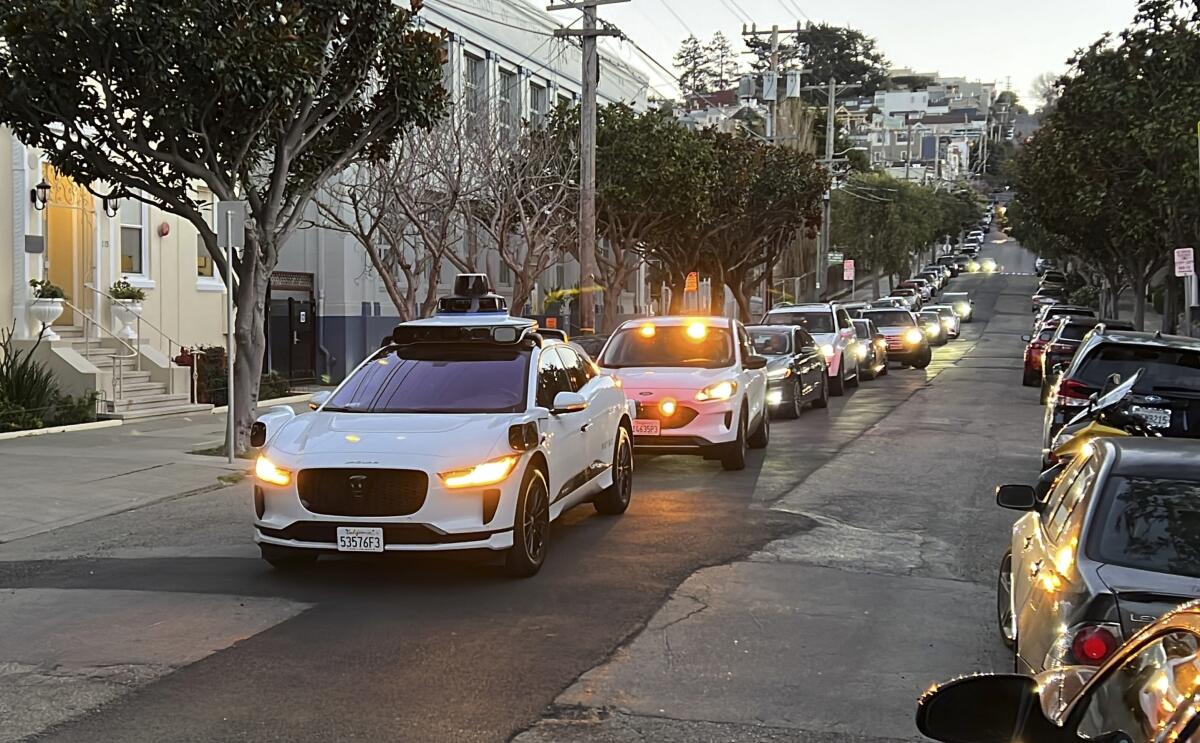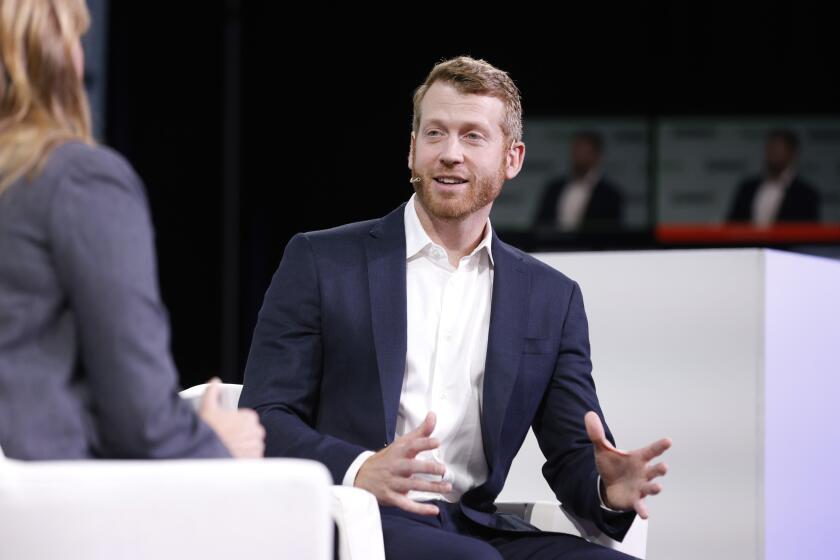As robotaxis descend in LA, officials already see trouble

- Share via
As Waymo robotaxis plucked up passengers for free this week in Santa Monica and Venice, worry grew among Los Angeles officials about the safety of driverless cars on city streets.
Mayor Bass asked regulators Wednesday to increase their scrutiny of automated taxis and said the city should have a say in how they are regulated.
The move comes after a Cruise robotaxi dragged a person down a San Francisco street last month and the company allegedly failed to disclose the footage to the state Department of Motor Vehicles. The DMV suspended the General Motors-owned company’s permits and Cruise has since announced it will suspend U.S. operations.
The incident in San Francisco — where the two driverless fleets were doing business — was among several that raised red flags among Los Angeles officials, who have begun to see more and more robotaxis being tested on city streets.
“To date, local jurisdictions like Los Angeles have had little to no input in AV (autonomous vehicle) deployment and are already seeing significant harm and disruption,” Bass wrote in a letter to the California Public Utilities Commission (CPUC), which oversees permitting for taxis.
There are no companies approved to charge passengers for driverless taxis in Los Angeles. But Waymo is allowed to operate fully autonomous vehicles and carry public passengers as part of its testing and promotion.
A Cruise robotaxi dragged an injured woman 20 feet. The company misled reporters about the facts, and maybe state regulators too.
City officials believe robotaxi companies will seek permits to do business in Los Angeles soon, and they are looking to the experience of San Francisco, where the vehicles have stopped traffic and interfered with first responders.
Bass cited several safety incidents in San Francisco in which robotaxis have blocked firehouse driveways, created traffic jams and interfered with active fire scenes. In Los Angeles, a driverless car wasn’t able to discern a city traffic officer’s signal, she said.
That incident occurred Aug. 3, when a Waymo driverless car failed to initially stop for a traffic officer at Beaudry Avenue and Wilshire Boulevard. The officer had been signaling east- and westbound traffic to come to a stop.
The driverless car stopped and then slowly approached and attempted to go around the officer. The officer moved in front of the vehicle for it to halt.
“Accurately detecting and responding to traffic officers and other road users such as pedestrians and cyclists is a basic requirement for safe AV deployment,” Bass wrote. “Unrestricted deployment before operators demonstrate this basic ability, and without clear requirements to address these concerns, present a serious risk to public safety.
“More testing is needed to ensure operators can safely expand their service.”
The letter and increasing unease among some on the Los Angeles City Council could signal a more protracted battle to come as the tech companies push to rapidly expand.
In San Francisco, officials have asked the CPUC to reconsider its permit allowing Waymo and Cruise to operate fare service 24 hours a day.
This week a Los Angeles City Council committee approved a motion that would ask the city attorney to work with San Francisco in its efforts. The same committee also sought to get a better grip on its own regulatory power.
With its thousands of miles of roads and millions of potential passengers, Los Angeles has long been considered a ripe market for robotaxis. While the utility commission has not yet permitted driverless taxis in Los Angeles, testing continues.
“We need actual regulations on robot taxis, and we should not be putting lives at risk by allowing our city to be a test subject for the tech industry,” Councilman Hugo Soto-Martinez, who introduced the motion to support San Francisco’s effort, said in a news release.
Just one day after state officials approved massive robotaxi expansion in San Francisco, a long line of the driverless cars come to a standstill and clog traffic in North Beach neighborhood.
Waymo, which has been testing its driverless white Jaguars in Los Angeles for more than a year, rolled out a months-long “tour” in October offering passengers free rides as part of the promotion scheduled for Santa Monica, Culver City, West Hollywood, Mid-City, Koreatown and downtown.
During that time, the company says it has worked with first responders on how to interact with the vehicles and that it hasn’t seen any injuries or significant safety issues related to the car.
But, it will not provide information about how many cars it has running or other operational details, a strategy that frustrates many in city government and harks back to the battles that played out between city officials and ride-hailing services in Los Angeles.
“We are disappointed in the mayor’s decision to oppose the deployment of autonomous vehicles in Los Angeles,” Waymo spokesman Chris Bonelli said in an email. “Our safety record and driving performance in L.A. are strong, and we don’t believe the letter is an accurate representation of Waymo and our experience.”
More to Read
Sign up for Essential California
The most important California stories and recommendations in your inbox every morning.
You may occasionally receive promotional content from the Los Angeles Times.













